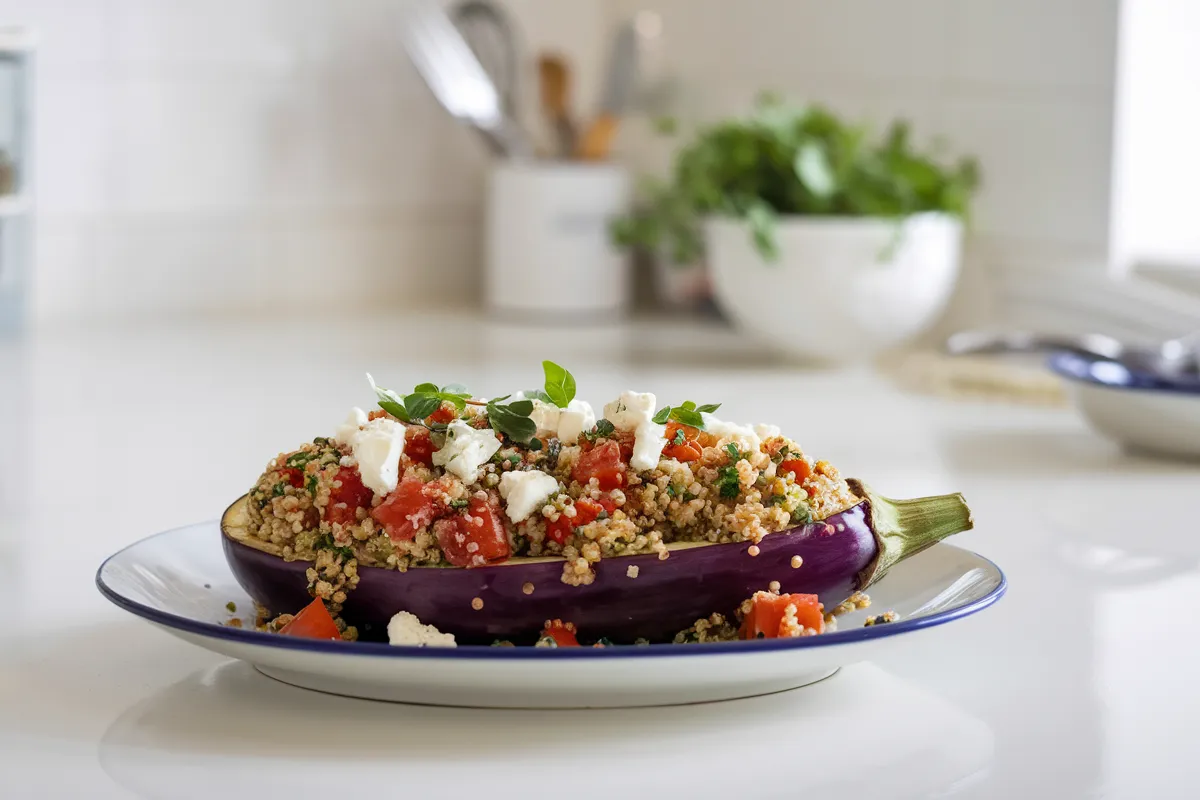Eggplant, also known as aubergine, is a versatile vegetable that offers a wide range of health benefits. When stuffed with various ingredients, it becomes a delicious and nutrient-rich dish that can be a great addition to your diet. In this article, we will explore the numerous health benefits of eating stuffed eggplant, why it should be a regular part of your meals, and how it can support your overall well-being.

Nutritional Profile of Eggplant
Eggplant is low in calories but high in fiber and essential nutrients. A cup of cooked eggplant (about 82 grams) provides the following:
- Calories: 20 kcal
- Carbohydrates: 5 grams
- Fiber: 3 grams
- Protein: 1 gram
- Fat: 0.2 grams
- Vitamin C: 3% of the daily value (DV)
- Vitamin K: 4% of the DV
- Folate: 5% of the DV
- Potassium: 6% of the DV
- Manganese: 10% of the DV
This nutritional profile makes eggplant an excellent choice for those looking to improve their diet. When stuffed with healthy ingredients, its benefits are even more pronounced.
1. What Makes Stuffed Eggplant Rich in Antioxidants?
Eggplant is a powerhouse of antioxidants, especially a type called anthocyanins. The most notable of these is nasunin, found in the skin of the eggplant. Nasunin helps protect the body’s cells from free radical damage, which can contribute to chronic diseases and aging.
Adding stuffed eggplant to your diet can boost your intake of antioxidants, which play a crucial role in reducing inflammation and preventing oxidative stress. This is particularly beneficial for brain health, as nasunin has been shown to protect brain cells from damage.
2. How Does Stuffed Eggplant Support Heart Health?
Eggplant is known for its heart-healthy benefits. The fiber in eggplant helps lower cholesterol levels, which can reduce the risk of heart disease. Additionally, eggplant is rich in potassium, a mineral that helps regulate blood pressure.
When you stuff eggplant with heart-healthy ingredients like vegetables and lean proteins, you create a meal that’s not only delicious but also supports cardiovascular health. The antioxidants in eggplant further protect the heart by reducing oxidative stress and inflammation.
3. Can Stuffed Eggplant Help with Weight Management?
Yes, stuffed eggplant is an excellent choice for weight management. Its low calorie and high fiber content make it a filling food that can help you feel satisfied without overeating. Fiber-rich foods like eggplant are known to promote satiety, helping you manage your calorie intake more effectively.
To maximize the weight-loss benefits of stuffed eggplant, consider stuffing it with vegetables, grains like quinoa or bulgur, or lean proteins like chicken or turkey. These ingredients provide additional fiber and protein, which are key to maintaining a healthy weight.
4. How Does Stuffed Eggplant Promote Digestive Health?
The fiber content in eggplant is essential for good digestive health. Dietary fiber helps prevent constipation by adding bulk to the stool and promoting regular bowel movements. Additionally, fiber acts as a prebiotic, feeding the beneficial bacteria in your gut, which are crucial for a healthy digestive system.
Including stuffed eggplant in your diet can help keep your digestive system functioning smoothly. Stuffing it with other fiber-rich ingredients like whole grains or vegetables enhances this benefit even further.
5. Can Stuffed Eggplant Help Regulate Blood Sugar Levels?
Eggplant has a low glycemic index (GI), which means it does not cause a rapid spike in blood sugar levels after eating. This makes it an excellent food choice for people with diabetes or those looking to manage their blood sugar levels.
When stuffed with nutritious ingredients like whole grains or lean proteins, eggplant becomes an even more balanced meal that supports stable blood sugar levels. The fiber in eggplant also slows the absorption of sugar into the bloodstream, helping to maintain steady blood sugar levels.
6. What Are the Brain-Boosting Benefits of Stuffed Eggplant?
Eggplant is rich in nasunin, an antioxidant that protects brain cells from damage. This compound is particularly effective at protecting the lipids in brain cell membranes, which are crucial for proper brain function.
Consuming stuffed eggplant regularly can help improve cognitive function and memory. The phytonutrients in eggplant promote blood flow to the brain, which is essential for maintaining cognitive health as we age.
7. How Does Stuffed Eggplant Support Bone Health?
Eggplant contains essential minerals like calcium, magnesium, and potassium, which are vital for maintaining strong and healthy bones. Manganese, another mineral found in eggplant, is crucial for bone formation and metabolism.
Eating stuffed eggplant can help you meet your daily needs for these minerals, supporting bone density and reducing the risk of osteoporosis. To enhance bone health, consider stuffing eggplant with ingredients rich in calcium and vitamin D, such as spinach or cheese.

8. Can Stuffed Eggplant Help in Cancer Prevention?
The antioxidants in eggplant, including nasunin and chlorogenic acid, have been shown to have anti-cancer properties. These compounds help neutralize free radicals, which can cause cellular damage and lead to cancer development.
Including stuffed eggplant in your diet may help reduce your risk of certain cancers. Chlorogenic acid, in particular, has anti-mutagenic properties, which means it can help prevent the mutation of cells that leads to cancer.
9. How Does Stuffed Eggplant Boost the Immune System?
Eggplant is a good source of vitamins and minerals that support a healthy immune system. Vitamin C, for example, is known for its immune-boosting properties, helping to stimulate the production of white blood cells, which are essential for fighting off infections and diseases.
Adding stuffed eggplant to your meals can help keep your immune system strong. Including a variety of vegetables and lean proteins in the stuffing can further enhance the immune-boosting properties of this dish.
10. What Are the Skin and Hair Benefits of Eating Stuffed Eggplant?
The antioxidants in eggplant not only benefit your internal health but also your skin and hair. These nutrients help protect your skin from damage caused by UV rays and pollution, keeping it hydrated and youthful. The vitamins and minerals in eggplant also promote healthy hair growth and can help prevent hair loss.
Eating stuffed eggplant regularly can contribute to healthier, more radiant skin and stronger, shinier hair. To maximize these benefits, consider stuffing eggplant with ingredients that are also rich in antioxidants, like tomatoes and bell peppers.
Stuffed Eggplant: A Versatile and Nutritious Meal
Stuffed eggplant can be prepared in a variety of ways, making it a versatile option for any meal. Depending on your dietary preferences and nutritional needs, you can stuff eggplant with:
- Vegetables: Adding a mix of vegetables like tomatoes, onions, and bell peppers increases the fiber and antioxidant content of the dish.
- Grains: Stuffing eggplant with grains like quinoa or bulgur provides complex carbohydrates and additional fiber, which can help regulate blood sugar levels and promote digestive health.
- Lean Proteins: Using lean meats like chicken or turkey adds high-quality protein, essential for muscle repair and growth, as well as iron and B vitamins.
- Cheese: Adding cheese can make the dish richer in calcium and protein, though it’s best to use cheese in moderation to keep the dish healthy.
Conclusion: Why You Should Include Stuffed Eggplant in Your Diet
Stuffed eggplant is not just a delicious dish; it’s packed with nutrients that offer numerous health benefits. Whether you’re looking to support heart health, manage your weight, improve digestion, or boost your immune system, stuffed eggplant can be a valuable addition to your diet.
By incorporating a variety of healthy ingredients in the stuffing, you can tailor the dish to meet your specific nutritional needs. So the next time you’re planning your meals, consider adding stuffed eggplant to the menu. It’s a tasty, nutritious, and versatile option that can support your overall health.
FAQs
1. Is stuffed eggplant suitable for a vegetarian diet?
Yes, stuffed eggplant is an excellent choice for a vegetarian diet. You can fill it with a variety of vegetables, grains, and legumes to create a satisfying and nutrient-rich meal.
2. How can I make stuffed eggplant lower in calories?
To make stuffed eggplant lower in calories, use vegetable-based fillings and lean proteins. Avoid high-calorie ingredients like excessive cheese or fatty meats. Baking the eggplant instead of frying can also reduce calorie content.
3. What are some good stuffing options for a gluten-free diet?
For a gluten-free version, stuff eggplant with gluten-free grains like quinoa or rice, or use vegetables and legumes. Ensure that any other ingredients used are certified gluten-free.
4. Can I prepare stuffed eggplant in advance?
Yes, you can prepare stuffed eggplant in advance. Simply stuff the eggplant, cover it, and store it in the refrigerator until you’re ready to bake. This makes it a convenient option for meal prep.
5. What are the best herbs and spices to use with stuffed eggplant?
Herbs like basil, oregano, thyme, and parsley complement the flavor of eggplant well. Spices like cumin, paprika, and garlic can add depth to the dish, making it even more flavorful.

